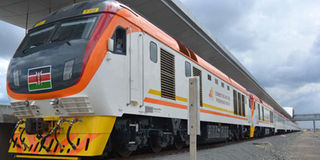Dalbit, Galana bag disputed mega SGR diesel supply contract

A new train at the Nairobi terminus on May 29, 2017.
Dalbit Petroleum Limited and Galana Oil Kenya Limited have been awarded multi-billion-shilling deals to collectively supply 38 million litres of diesel to keep passenger and cargo locomotives running on the standard gauge railway (SGR) for a year amid protest by rival oil marketers.
Documents seen by Nation showed the tender team at Kenya Railways Corporation recommended that Dalbit be awarded a contract to supply automotive diesel to its Mombasa Port Reitz depot at the prevailing prices set by the Energy and Petroleum Regulatory Authority (Epra) at a discounted rate of Sh5.
Galana has, on its part, been endorsed for a deal to supply fuel to the Nairobi SGR depot at the prevailing Epra prices at a discount rate of Sh1.12.
Going by the current Sh167.28 retail price of diesel in Nairobi, it means that the two firms will jointly service supplies worth more than Sh6.2 billion.
The tender for the mega fuel supply contract was floated in March and attracted eight bids by top oil marketers—Galana, Dalbit, Rubis Energy Kenya, Hass Petroleum, Trinity Energy Kenya Limited, and Total Energies Marketing Kenya Plc. Others were Vivo Energy Kenya and One Petroleum Limited.
Only three bidders made it past the preliminary tender evaluation stage — drawing protests by Vivo, which unsuccessfully pushed for a review of the tender decision. TotalEnergies also sought to be enjoined in the matter contesting the tender award to the two firms and has filed a separate plea for review.
In an application to the Public Procurement Administrative Review Board (PPARB), Vivo claimed it was unfairly locked out for minor inconsistency in the pagination of its bid documents and failing to provide a quality assurance certificate by the Kenya Pipeline Company yet it wasn't a requirement in the bid documents.
The board, however, said the mix-up in pagination in the tender document was grave and went against the requirements for a chronological flow of documents. The PPARB said Vivo also breached the bid requirements when it presented a KPC quality assurance certificate dated February 19, 2021, which did not align with a requirement that the document covers the 2022/23 period.
The board dismissed Vivo's protest, paving the way for the award of the contract to Dalbit and Galana. It is not clear if Vivo will escalate the fight to court. The outcome of Total’s application may also determine the final award of the tender.
The mega fuel order presents a peek into the cost of running passenger and cargo trains on the Chinese-built SGR.
The latest operating costs of the SGR are not readily available although past documents tabled in Parliament showed it cost about Sh18billion to run the passenger and cargo trains—which means that fuel alone takes up at least 34 per cent of the overall operating costs of railway which have in the past dwarfed revenues, fanning public outrage over the viability of the landmark project.
The SGR project, which cost $3.2 billion (Sh451.4 billion) that was largely borrowed from the Exim Bank of China in May 2014, operates passenger services from Nairobi to Mombasa and an inter-county service with stations at Athi River, Emali, Kibwezi, Mtito Andei, Voi, Miasenyi, and Mariakani stations.
Passengers pay Sh1,000 for economy class seats and Sh3, 000 on fast class seats between Nairobi and Mombasa aboard the express train.





